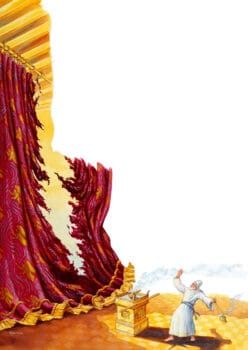Daily Lesson for Thursday 5th of March 2026
Read Colossians 2:20-23. How do you understand Paul’s admonitions in light of the other elements discussed in this chapter?
As in his epistle to the Galatians, Paul characterizes the concern over keeping Jewish ceremonies as “the basic principles of the world” (Colossians 2:8,20, NKJV; compare Galatians 4:3,9). In other words, like the earthly temple, these things belong to the earth, but our citizenship is in heaven. We need not be encumbered with the ceremonial law because it merely foreshadowed the reality that we now enjoy through Christ. That is, even though originally given by God, these ordinances, having served their function, are no longer needed.
Because all these regulations were done away with at the Cross, as indicated by the divine hand rending the temple veil (Matthew 27:51; compare Daniel 9:27), Christians (including Jewish-Christians) are not subject to these regulations. By submitting to them, we would actually be identifying ourselves with this world, which is passing away, in contrast to the new world promised us in Christ.
After all, we look forward to “new heavens and a new earth, wherein dwelleth righteousness” (2 Peter 3:13) and not merely a renovation of this old one.
Besides the fact that Pharisees and scribes had added additional human requirements on top of the Mosaic regulations (see Mark 7:1-13), the perpetuation of Old Testament ceremonies, which had been fulfilled by Christ, could no longer be considered divinely required, but only as humanly imposed duties. Indeed, it seems that they were becoming a burden to faith, as opposed to something that would enhance it. It’s so easy to start to look at doing all these things as not only making oneself superior to those who don’t, which is bad enough, but also perhaps even subtly as somehow being meritorious for salvation, a trap into which we don’t want to step.
Throughout Christian history, Bible experts have succumbed to the temptation to make religious pronouncements, usurping the role of the Holy Spirit in guiding believers as to what the text means. Christ Himself is the fountain from which springs the truth of the Scriptures as taught by Paul and the other Bible writers.
|
How can we make sure we understand that our only foundation for salvation is from what Jesus has done for us, outside of us, in place of us—regardless of whatever He does in us? |



